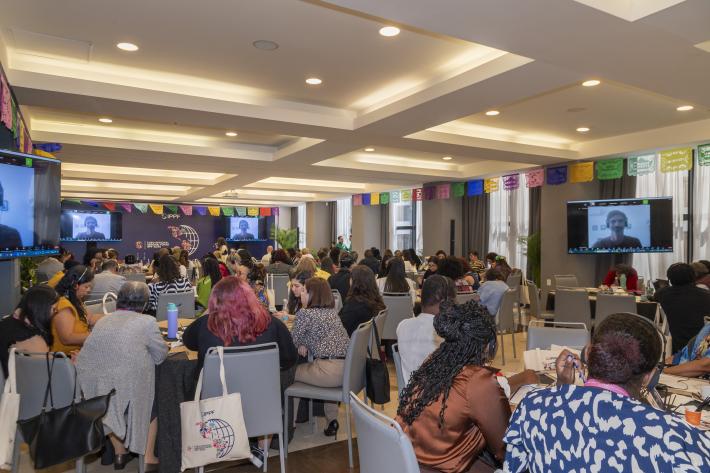Latest press releases
A selection of stories from across the Federation
Americas & the Caribbean
Breaking: IPPF Global Research Exposes Devastating Impact of the Trump Administration
Over Half of Partners and $85 Million Affected
For media enquiries


| 24 July 2024
IPPF ACRO and FPA celebrate historic decision for LGBTQI+ people in Aruba and Curaçao!
Haz click aquí para leer esta historia en español. On July 12th, the Dutch Supreme Court validated same sex marriage in Aruba, Curaçao, and St. Maarten, emphasizing that prohibiting same-sex marriage violates the constitutional ban on discrimination. The court’s decision upholds a ruling from September 2021, which had been challenged by both countries. IPPF ACRO and FPA urge the governments of Aruba and Curaçao to promptly comply with the Supreme Court's decision as it is a matter of fundamental rights. Ensuring adherence to this ruling is essential for the protection and equality of the LGBTQI+ community. Coming after Aruba’s parliament rejected the marriage equality bill almost a month ago, this ruling continues a trend in the region to legalize and protect LGBTQI+ populations. FPA and Famia Plania, IPPF Members in Aruba and Curaçao, has for decades advocated and supported efforts towards LGBTQI+ equality, with quality sexual and reproductive health services provision as well as community articulation. “This positive outcome is a major step towards visibility, rights and access to health, such as sexual and reproductive services for all LGBTQI+ people in the Dutch Caribbean. At FPA, we are deeply committed towards inclusion, and as we celebrate this ruling, we will continue using our voices to advocate for social change,” states Evelyn Yarzagaray, Executive Director of FPA, IPPF Member Association in Aruba.

| 09 May 2024
IPPF celebrates historic milestone for HIV prevention in the Caribbean
Haz click aquí para leer este posicionamiento en español. Port of Spain, May 8.- The Jamaica Family Planning Association (JFPA), St. Vincent Planned Parenthood Association (SVGPPA) and the International Planned Parenthood Federation Regional Office in the Americas and the Caribbean celebrate Belize, Jamaica and St. Vincent and the Grenadines for receiving the World Health Organization’s certification for eliminating perinatal transmission* of HIV and Syphilis, a historic milestone for women and infants in the Caribbean. This significant achievement advances efforts to effectively prevent HIV transmission in our region. We commend the commitment of governments, health professionals, civil society organizations and communities, including the Jamaica Family Planning Association (JFPA) and St. Vincent Planned Parenthood Association (SVGPPA), both IPPF Member Associations, to invest in adequate attention for HIV prevention and sexual and reproductive health and rights. For Eugenia Lopez Uribe – IPPF Americas and Caribbean Regional Director, “This juncture presents an excellent opportunity to enhance HIV prevention strategies and to show how a well-done prenatal care, where women have access to all necessary tests and treatments, including HIV tests and medicines, works. It's a collective victory: for science, which has advanced and shows its efficiency, and for decision makers who adopt evidence-based responses to HIV." JFPA and SVGPPA have been key in responding to HIV in their countries, as they have been working to integrate HIV and STI services into its overall family planning offering. JFPA provides counselling, testing and referral of pregnant women at their first ante-natal visit, while SVGPPA offers HIV/STI screening and counselling, both working together with strong HIV organizations on the ground.

| 16 October 2023
IPPF ACRO express concern over guidance of the Zambian Ministry of Health who advised against the use of the term “sexual and reproductive health and rights”.
At a time of profound and multiple crises, it is worrying that the focus of any government's action is to go back on already consolidated international commitments, particularly those which recognize, based on evidence, that Sexual and reproductive health and rights (SRHR) are fundamental human rights, central to eradicating poverty and achieving sustainable development across its social, economic, and environmental dimensions. SRHR – which encompasses a range of issues, including universal access to SRH services and supplies, comprehensive sexuality education, and ending gender-based violence and harmful practices such as early, child and forced marriage – are fundamental to the ability of all people, especially women, adolescent girls and young people, to lead full, satisfying, healthy and productive lives. SRH services are a critical aspect of SRHR, but a complete understanding of sexual and reproductive health and rights goes far beyond on access to health facilities and services to include an array of social, legal, institutional, and financial arrangements that enable individuals to exercise their rights in general and addresses the underlying social determinants. In this regard, our Latin American community urges the government of Zambia to review its position and, on the contrary, to improve and expand the SRHR services, including increasing funding in this sector, for example by investing in fulfilling the human rights of women and girls, in all their diversity, as gender discrimination is one of the leading determinants of poor health and unwanted SRHR outcomes. It is also key to addressing inequities in access due to poverty and multiple forms of discrimination, stigma and social and economic exclusion affecting various population groups. We conclude by highlighting the importance of evidence-based policies and, in 2023, the data indicates that effective policies are not those based on stigma and discrimination or elimination of rights. On the contrary, effective policies are those that include, care for, and treat all people as subjects of rights, capable of making decisions about their health and reproductive life, with the support of a State committed to promoting citizenship and the human dignity of their people. Here, at IPPF ACRO, we will remain attentive and always willing to contribute so that rights do not go backwards and no one is left behind. In solidarity, Eugenia Lopez Uribe Regional Director for the Americas and the Caribbean
















